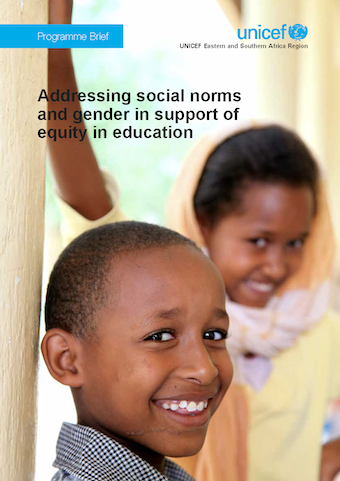The Role of Social Norms in Decisions to Provide Schooling to Children with Disabilities in East and Southern Africa

UNICEF’s Regional Office for East and Southern Africa has pledged to continue the investigation of the social context of disability initiative to address harmful practices in many Sub-Saharan countries where children with disabilities are the first to suffer from harmful practices and the last to benefit from reforms in spite of conducive legislation and policy environments, and programs meant to provide all children with access to education.
As a first step, the present UNICEF report aims to capture the possibility of conceptualizing social norms surrounding disability and provide empirical evidence whether social norms are present in people’s thinking on disability. A broad, context-based model of the social problem of disability was developed first, including components related to social expectations, similar to Bicchieri (2017), but further developing a richer contextual and cultural component. Included are dimensions related to behaviour systems of maintenance and control as well as the survival of behaviour over time. With the help of local governments, the model was then qualitatively tested in Eswatini, Kenya, and Namibia, through ninety focus group discussions, with parents, teachers, children (including those with disability) and local experts in two economically contrasting regions per country. Analyses showed that: (a) widely held practices of actively hiding children with disability are related to three broad social norms: (1) overprotection, (2) a mind-your-own-business demeanour, (3) and avoidance of quick decisions by fathers; that (b) these norms are grounded in mechanisms of social maintenance; and that (c) all three countries show cultural differences in qualities of sociality. Together, the findings underscore a need for attention to intersectionality in addressing disability, rather than single-issue organizing, particularly when it comes to the combination of disability, culture, gender violence, and poverty. This can be addressed through various C4D strategies including publicising positive deviants’ successful stories across the region.
As a first step, the present UNICEF report aims to capture the possibility of conceptualizing social norms surrounding disability and provide empirical evidence whether social norms are present in people’s thinking on disability. A broad, context-based model of the social problem of disability was developed first, including components related to social expectations, similar to Bicchieri (2017), but further developing a richer contextual and cultural component. Included are dimensions related to behaviour systems of maintenance and control as well as the survival of behaviour over time. With the help of local governments, the model was then qualitatively tested in Eswatini, Kenya, and Namibia, through ninety focus group discussions, with parents, teachers, children (including those with disability) and local experts in two economically contrasting regions per country. Analyses showed that: (a) widely held practices of actively hiding children with disability are related to three broad social norms: (1) overprotection, (2) a mind-your-own-business demeanour, (3) and avoidance of quick decisions by fathers; that (b) these norms are grounded in mechanisms of social maintenance; and that (c) all three countries show cultural differences in qualities of sociality. Together, the findings underscore a need for attention to intersectionality in addressing disability, rather than single-issue organizing, particularly when it comes to the combination of disability, culture, gender violence, and poverty. This can be addressed through various C4D strategies including publicising positive deviants’ successful stories across the region.
Year:
Organisation:
UNICEF ESA
Marginalized & Vulnerable group:
Socially & Economically excluded groups, Persons with disability
Topic:
Inclusive Pedagogy & Practices
Level of Education:
Across the education sector
Type of Resources:
Research & Policy Papers
Country/Region:
Africa
Language of Publication:
English